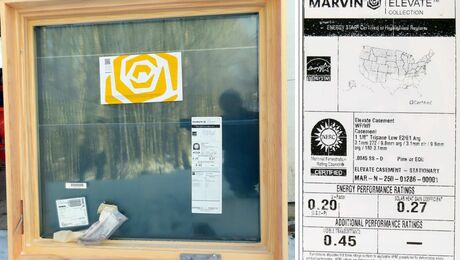Going all electric with ccASHP in Connecticut or stay with cheap(er) natural gas?
Our AC broke down two years ago, and we are considering switching from a gas furnace+AC combo to a greener version, a ccASHP. Good for the environment, which we love, however, with electricity prices 2nd highest in the nation and gas cheap(er) in Connecticut we are wondering how much more this would cost us. Electricity in CT is not exactly renewable, but we’re hoping this will improve.
I found two comparisons of gas furnace vs. heat pump costs in CT+MA:
House with average insulation: gas $700+/heat pump: $1,000+ (Robb Aldrich @ StevenWinter)
New 2000sf in MA: gas: $878/heat pump: $1,256 (see attachment).
We pay $900 for gas (which includes hot water), and use heat all day since my husband works from home.
So, will the heat pump cost us $300-$500 more, or will the heat pump be that efficient that we won’t be paying too much more?
Secondly, if we go with the ccASHP, mini-split or Carrier Infinity?
Current system:
heating: 60,000 Btu 90 % Trane HE (still working fine/no issues),
cooling: 30,000 Btu, Trane HE; 2.5 ton condenser.
Some info on the house:
Located in Hamden, CT (zone 6), 2 ½ stories, 1580 sqft, 2 adults.
The HES, done in January 2017 when we moved in, brought the blower door test results from 2483 to 1676 cfm/50 after air sealing, weatherization and installing all LED bulbs.
We installed solar in February 2018, which covers almost all our electric needs except the electric car and cooling (AC has been broken).
In 2018, we worked on improving the building envelope and added insulation:
Attic floor: pre-existing R30 Fiberglass + 30 Cellulose added, total: R60.
Garage ceiling: pre-existing 21 Fiberglass + 25 dense-packed Cellulose added, total R46.
Garage walls: 0 + 13 rigid foam added
Walls: R19 (= max, no space to add more insulation).
We tried to get an estimate for outside wall insulation but haven’t found anybody yet who would do this. It would also mean adjusting windows, which we’re not prepared to do right now.
Despite the added insulation, the second HES blower door test in Dec 2019 did not show much improvement (1548 cfm), probably because our bathroom renovation contractor did not close the walls he was working on or the insulation guys didn’t do any air sealing in the attic.
The gas heating bill did go down about $170/year (from 685 to 577 CCF).
We were hoping to use our current duct system for the heat pump, although mini-splits may be more efficient, and Asian manufacturers don’t usually use those ducts (Yes, I’ve been reading quite a few of your articles here).
So, here are some of the quotes we got:
Fujitsu Elite dealer (only does ductless mini-splits, not ducted ones):
Fujitsu AOU36RLXFZH, SEER: 20, HSPF: 10.3, COP: 4.
one outside unit+4 zones; upstairs: 7+7 BTU, downstairs (open floor): 15+ 9 BTU.
Total BTU: 38000. Price: $11,500 + electric work.
He had somebody do Manual J (8th ed., Wrightsoft Right-Suite software):
1st floor: 25291 Btu heating, 16971 cooling, proposed Btu: 24000 capacity to 27K (2 heads)
2nd floor: 16212 Btu heating, 14208 Btu cooling, proposed Btu: 18000 capacity to 22K (2 heads)
Total: 42000 BTU
Other estimates (include permits+rebates):
Carrier Infinity 16 SEER heat pump: $12,365 [probably not enough without furnace back-up?]
Carrier Infinity 20 SEER inverter heat pump: $18,125
Mitsubishi MultiZone Hyper Heat Pump w. 4 air handlers, 1×12, 3×9, total: 39000 BTU, $16,500
If we go with the mini-split, could we keep the current Trane for heating when it’s really cold until it fails?
In the long run, we would like to get rid of the gas hot water heater, too, but the heat pump hot water heater seems to have its own issues, e.g. make the room cooler, which would not be that great since we have our washer in the same room.
Oh, and we are keeping the old-fashioned wood furnace in case of a power outage, since we have free wood on the property and use it about 5-8 times a year when the temperature is in the teens at night.
Any help is greatly appreciated!
GBA Detail Library
A collection of one thousand construction details organized by climate and house part










Replies
Marion,
I should probably stand aside and let Dana Dorsett handle this one. You certainly have provided way above average details to work with.
I will note that your electrical sources will soon be changing for the better. Once the "snots with yachts" get over thinking they own the offshore winds and water, more and more wind farms will be placed. I think two major offshore leases have gone through with MA and RI. Once flow batteries get funded properly and exit the test period we will all start getting greener power.
Our brighter future aside, I remain doubtful of the comparisons between gas and heat pump costs you have quoted. That is a Dana question for certain, though I am suspicious that annual costs were used. It should be noted that your furnace does not use gas when providing AC. It does use a fair amount of electricity though, which may have been conveniently left out of the costs shown.
The idea of dumping the gas heater is a close call. If you only keep the gas water heater the carrying charges for the hookup will make your effective therm costs soar. When I had gas, the summer bills for the water heater therm usage was typically less than the hookup and pipe fees. Pipe fees and other charges may also start eroding the gas advantage in your future. New England in general has maxxed out the available pipelines and, if I read the stories correctly, no where to jam in any more. At least not without a big fight.
I did a deep dive for my own purposes on water heater choices and it basically comes out that gas will beat any of the alternates easily in per gallon of hot water costs, IF not a stand alone hookup like noted above. Propane eliminates the monthly hookup charges, but highly variable gas costs and tank fees are potential pitfalls. And the tanks are ugly.
If you do go "all in" on electric ASHP for your home, the day to day efficiency of choosing a HPWH becomes a complex variable that will average out as being roughly twice as efficient as a straight up electric resistance heater. The efficiency can be improved with summer weather air ducting, but that adds complexity and holes in walls. The energy theft penalty relative to heating your home with ASHP is very minor in mild weather and still not too bad at 5F with the new units designed for the northern climates. Just don't expect magical free hot water, or a COP of 4 to have any real meaning relative to how much the hot water will cost you per gallon.
The interior air problems of HPWHs I have commented on in other threads. The cooling effects are the most bothersome feature and the large volumes of air one needs to run through them. If you have conveniently isolated parts of the basement to place a HPWH it becomes less of a comfort issue. I personally would not keep it in the laundry contrary to other postings. The energy gains are pretty small for the bother of it being in a linty small room.
As to the main question of cost over time, that is a slippery eel if ever there was one. Comfort from properly sized and installed ASHP can be very good. Some house layouts do not lend themselves to these units. It can be a difficult assessment to make. You have all the duct work and such in place, but air handling units for ASHP might be too pricey.
We do need to stop using gas and fracking the crap out of our water supplies (much shouting provoked) and get to 100% renewables as fast as our heat stroked bodies can get there. I finally got a TV I could hang on my wall after waiting 50 years, maybe we will finally get fusion energy. Its already been 50 years working on that so, who knows.
CT resident here as well. I'm on the shoreline east of New Haven. I heat and cool my entire 1400 Sq ft split level house with 2 12k cold climate mini splits. I had solar panels installed 5 years ago and they will be paid off next year. My electric bill is $9.44 every month for just the service charge.
I have natural gas in front of my house and I looked into connecting. The biggest issue was the $25-30 monthly service/connection charges before you even use any gas. Compared to the $9.44 Eversource connection charge the savings are massive.
I have also have a GE Geopspring heat pump water heater running for 5 years with no issues.
Not only is the cost savings massive but I am using zero fossil fuels so the environmental impact is even bigger.
This year I actually got a negative bill in May as I had excess net metered solar that Eversource bought back from me. Eversource resets your net metered power in April and buys the excess though it's at a low wholesale rate. After the mild winter here I had a few hundred excess kilowatts come April.
> I am using zero fossil fuels
Maybe if you produce enough excess, but not true in the typical "net zero energy" case. A 10am sunny day kwh doesn't offset a peak load kwh (in fuel use or in environmental impact). This difference will increase as utilities deploy more solar.
I would stay with gas for now, bank the savings, and switch in the future IF the economics look better at that time. Right now, the majority of New England electricity production is from natural gas fired generation. I don’t think this likely to change significantly in the next 5-10 years. Dana and I have our disagreements about the ability of wind to offset a large portion of this (lots of past discussions on this; and lots of info on both sides so good to read if you’re interested). With natural gas fired generation, you’re really not changing away from gas by going all electric at this time.
I expect that heat pump technology will likely improve over the life of your new system, so that you’ll have much better options at your next replacement.
Bill